Dec 26, 2025
Dec 26, 2025
by Sakshi
- Two Faces of the Republic
- Acquiring Real Estate in Delhi
- Wearing the Mask of Celebrity
- Relevance of de Tocqueville
- Think it Through
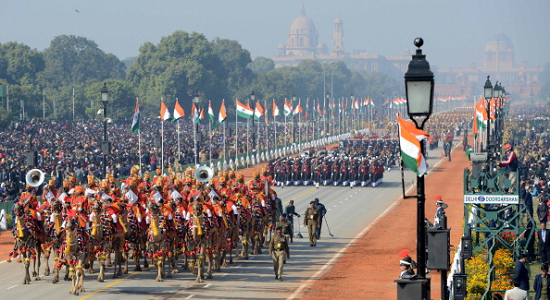
What strikes me in the Republic Day celebrations is a glaring contrast. On the one hand, you see the spectacle of stirringly smart march past of infantry, cavalry and mechanized regiments decked in all their finery and official decorations won over the years, and on the other hand, you see seated all huddled up, amidst very elaborate security, on the southern side of Rajpath besides the President of India, almost all those who constitute the Government of India. The former has performed credibly well to uphold the integrity and dignity of the Republic while the latter has done all that is humanly possible to let the Republic down.
The same glaring contrast again meets the eye in the colorful ceremony called ‘Beating Retreat’ – a ceremony that reminds us of our British connection and marks the end of Republic Day celebrations. It is held in Vijay Chowk at Rajpath, flanked by North and South Blocks. Marching in unison in beautifully variegated formations the massed bands of the three services play the all-time favorites like Colonel Bogey, that ever-popular march written way back in 1914 by Lieutenant F J Ricketts, the famous Army bandmaster, and of course that immortal piece, Sons of the Brave. This year’s additions were Independence March, Young India and a few more.
Towards the end, as the sun is getting ready to say farewell to the day, the three band contingents march forward. They take position close to the President's seat. The drummers, mostly from the pipe bands, perform the Drummer's Call.
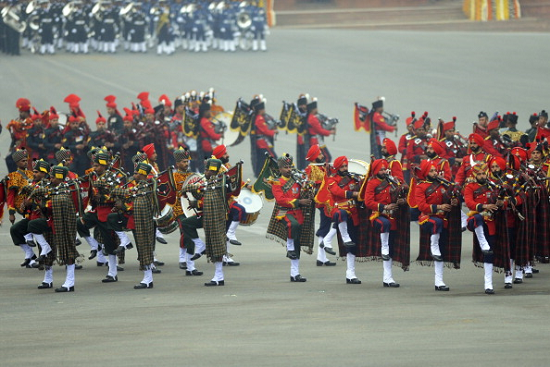
My favorite in this bewitching spectacle is the last tune played before Retreat, when the National Flag is lowered. It is the famous hymn written by the Christian priest Henry Francis Lyte when he knew he was dying of tuberculosis. It is called Abide With Me set to music by W M Monk. It was a favorite of Gandhi. And it has remained part of the repertoire over the years when many other foreign tunes were phased out to make way for their Indian counterparts. Then chimes made by the tubular bells send forth their message that the ceremony has to end.
The buglers’ call for Retreat is sounded. All the fluttering flags that remained silent spectator of the spectacular ceremony are brought down. The band master then marches to the President to inform that the ceremony is over. He asks the permission of the Supreme Commander of India’s Armed Forces to retreat.
The bands then march back, striking the stirring tune Saare Jahan Se Achcha. Indeed it was so and would have been too, had not the communal virus gripped the imagination of the poet who wrote it on the request of a favorite student of his. The student was the great patriot, Har Dayal. His teacher was Mohammed Iqbal.
As soon as the bands cross Raisina Hill a spectacular illumination display is set up on the North and South Blocks, and the Parliament building. The band plays the National Anthem again as the President receives the final National Salute for the day.
Deeply moved I go back to read the Hymn that haunts me. Let me share it with you. Here’re the first two stanzas.
Abide with me; fast falls the eventide;
The darkness deepens; Lord with me abide.
When other helpers fail and comforts flee,
Help of the helpless, O abide with me.
Swift to its close ebbs out life’s little day;
Earth’s joys grow dim; its glories pass away;
Change and decay in all around I see;
O Thou who changest not, abide with me.
And then I think of the man whose favorite it was.
Yes, the darkness had started deepening even when he was around. After his colleagues of yesteryears who courted imprisonment on his bidding came out of jail, they thought they had no use of the man who was once their mentor. He had served their purpose. He had challenged the British imperial might. The British themselves decided to quit on their own. They knew the war had impoverished them to hold on.
We chose to tread a different path than what Gandhi had recommended. He knew India and its people, and their problems. But his recommendation didn’t fit in modernistic perceptions of a new generation of leaders. Where has our self-chosen path led us to after six decades – the highway of liberalization dictated by free market economies that Uncle Sam showed us? It is a highway on one side of which stand air-conditioned Malls jostling with the Antilia type towering structures that look down on sprawling slums on the other side.
Poverty indeed is as a concept that is both slippery and elusive. It slides through the dexterous fingers of all the manipulators of figures and wielders of statistics. Look around and you see it writ large on faces of poor and deprived. Any meaningful estimate of people living below poverty line will show that more than half the population lives a sub-human existence.
What a splendid social order and rule of law have we created in six decades after Independence where politicians like A Raja and Suresh Kalmadi may spend about a year in jail each – of course assured by their cronies of all creature comforts except their own beds – but both men, who are Lok Sabha MPs, have been nominated to important parliamentary committees? How about Kanimozhi and her involvement in 2G spectrum scam in May 2011? A few months in Tihar jail and now free. Forget about the thousands of crores looted from the treasury and the CBI inquiries. All these are just for public consumption.
Where do we go from here?
Acquiring Real Estate in Delhi
What matters the most in the capital of India is to be the owner of what’s called real estate. With everything in free fall, most importantly, moral standards, it is the one asset that goes on appreciating by the day. Yes, more than any other asset.
And those who have mastered the craft of building this asset tell me the way to begin is simple. Very simple indeed! All you’ve to do is to grab as large a plot of land in, what’s called in Delhi and nowhere else in the world, a so-called unauthorized colony. (This is a euphemism in the Capital of India is for Government land.) Then slowly and gradually go on grabbing a meter or two on every side of your holding. Invest whatever you’ve in building some sort of boundary. Also spend whatever time you can to forge political connections by becoming an active worker of the party in power.
Thereafter, wait for the colony to grow which it inevitably will, with thousands pouring into the city every day of the year. Most certainly, before the next elections your colony with scores of other unauthorized colonies will be regularized. That means the water and electricity you were earlier managing – another Delhi euphemism for stealing – will be yours as a matter of right. Meanwhile, in one fell stroke the price of your holding has doubled, if not tripled.
If you’re more adventurous, go to what is called an authorized posh colony in South Delhi. Select a spacious location on a pavement and set up a small stall to sell something. Make arrangement with a shopkeeper to keep your wares for the night. If you were so lucky as not to be visited by a custodian of law – I mean a policeman – on the very first day itself, rest assured he’ll show up on the second day. After a crudely rough introduction he’ll cool down after settling the current rate of hafta which is the daily collection traditionally called weekly due.
Yes, there’re days when even after collecting the daily levy, you may not be allowed to do business. That’s the day of burra sahib’s visit to the area. Don’t worry it will be business as usual the following day.
If you don’t want even this occasional interruption, there’s a way out. Invest whatever you can to buy a medium-sized clay statue of a god or goddess – and there’re plenty of them to choose from. Buy a couple of garlands of withered flowers from a flower vendor who had, before you arrived, grabbed a captive corner outside a temple after negotiating terms with the Pujari. You set up a make-shift place of worship. Remember the wise dictum from the commercial world: a business that doesn’t expand is bound to flounder. So, you must add a few feet of the pavement within the periphery of your operations.
After about a few months in business, convert your operation into a temple. Places of worship are exempted in our society from the rule of law. Thereafter, you can go on expanding, both vertically and horizontally. If you want to buy an insurance, get a plaque declaring your premises as an ancient temple. Soon a stage will come when you may even defy the hafta wala.
Hereafter you have to consult an expert.
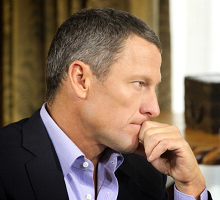 Lance Armstrong will go down as perhaps the most egregious drugs cheat in the history of sport. He cheated his way not once, but in an unprecedented seven victories in the Tour de France and many other championships. He bullied the cycling establishments into turning a blind eye. When he recovered from cancer he managed to endear himself as an American hero.
Lance Armstrong will go down as perhaps the most egregious drugs cheat in the history of sport. He cheated his way not once, but in an unprecedented seven victories in the Tour de France and many other championships. He bullied the cycling establishments into turning a blind eye. When he recovered from cancer he managed to endear himself as an American hero.
Now after his own admission of cheating, the hero has sunk to somewhere below zero. You may ask why did he do all this? The answer is what Upton Sinclair called ‘Celebrity is a mask that eats into the face’.
Do you know of Stephen Law who teaches philosophy at Heythrop College in the University of London? He also edits the philosophical journal Think, meant to keep general public abreast with issues of philosophy. He coined the phrase “intellectual blackholes” that gullible people are drawn into. Seeing things around, I reckon moral balckholes are far more dangerous than their intellectual counterparts. And perhaps the most dangerous of the moral blackholes of our time the credo of success-at-any-cost. Damn all ethical considerations, just succeed. The result is what William James called “The moral flabbiness born of the exclusive worship of the bitch-goddess SUCCESS.”
It is only when the event breaks that we start analyzing what happened and how and, perhaps, most importantly, why. However quietly and imperceptibly, forces are always at work shaping and conditioning the outline of the story. Rare indeed are chroniclers of the present who are attuned to the barely audible murmurs of the subterranean forces.
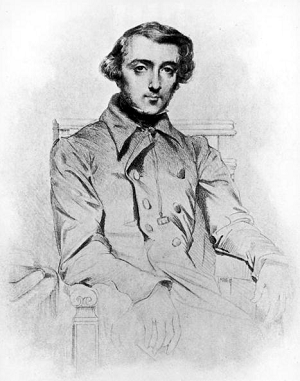 One such rare being was the Frenchman, Alexis de Tocqueville.
One such rare being was the Frenchman, Alexis de Tocqueville.
The French Government had sent him on a trip to report (of all the things in the world) on prison conditions in the USA. He very wisely decided to ignore his brief, or rather widen its scope beyond recognition. The result was his study, Democracy in America. It is indeed a profound study of the very nature of American democracy – “its inclinations, its character, its prejudices, and its passions, in order to learn what we have to fear or to hope from its progress”. After more than a century and a half, this work is still rated as one of the most insightful studies of the American political system.
His central theme hasn't lost a bit of its relevance, i.e., what is there for the rest of the world “to fear or to hope” from what straddles the world stage as icons of Americana? These “fears” and “hopes” have acquired, after the collapse of the Soviet Communism, a new thrust and relevance in our unipolar political world.
Disillusioned with political developments following Napoleon’s take-over, he retired from public life to write L’Ancien Régime et la Révolution with the more popular English title The Old Regime and the French Revolution. He investigated in it the causes and forces that caused the French Revolution.
Strange indeed are the contemporary uses of the book, and of all the places in the world in Communist China. Now that the contradictions between what the party had preached and what it practiced could not have been more flagrant, top leadership became conscious that it was in the process of subverting its own legitimacy. Beneath the surface, deep resentment of the inequalities that came with economic growth was becoming pervasive, and the Party was quickly turning into a crony-capitalist cabal. And above all, if and when unemployment grows and the dreams of ordinary Chinese are dashed, there will be hell to pay. If Tocqueville's book is being read, it is because at least some of the men who rule China are wondering whether their country is near a tipping point – in which a seemingly minor event (the self-immolation of a Tunisian street vendor, for example) sets off a conflagration. So, the top leadership recommended the reading of The Old Regime and the French Revolution.
Now that Mummy has passed the mantle of leadership to Rahul Baba, he must be worrying about the legitimacy of what has been bequeathed to him. I strongly recommend he sits down to read The Old Regime and the French Revolution. Our ancient regime is the discredited old order we inherited from the British and refurbished it to deceive the people. They have now started discovering.
Since time immemorial, curious people have asked where, after all, did the universe come from? There’s no thinking being who hasn’t asked himself this question sometime or the other.
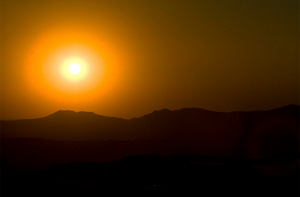 The most fascinating explanation to this never-resolved mystery is the Invocation of Ishopnishad, one of the principal Upanishads. Translated in English it says: “That is full; this is full. The full comes out of the full. Taking the full from the full the full itself remains.” (Radhakrishnan translation). This is followed by the first verse which says: “Whatever moves in this moving world, is enveloped by God. Therefore find your enjoyment in renunciation; do not covet what belongs to others.”
The most fascinating explanation to this never-resolved mystery is the Invocation of Ishopnishad, one of the principal Upanishads. Translated in English it says: “That is full; this is full. The full comes out of the full. Taking the full from the full the full itself remains.” (Radhakrishnan translation). This is followed by the first verse which says: “Whatever moves in this moving world, is enveloped by God. Therefore find your enjoyment in renunciation; do not covet what belongs to others.”
It was Gandhi who after reading and mulling over its implications, said: “If all the Upanishads and all the other (Hindu) scriptures happened all of a sudden to be reduced to ashes, and if only the first verse in the Ishopanishad were left in the memory of the Hindus, Hinduism would live forever.” Swami Chinmayananda went to the extent of describing this verse as “a miniature philosophical textbook.”
Our exponents of rationalism and more importantly, secularism will object to the above as metaphysical. It doesn’t measure up to rationalist criteria. So, nowadays, we have a secular answer: the Big Bang.
And yet that answer – howsoever plausible – is not satisfying. After all, we can still ask where the Big Bang came from; and we can still wonder, sensibly enough, how something (the universe) could come from nothing (whatever came before it).
Images (c) Gettyimages.com
29-Jan-2013
More by : Sakshi

|
"Now that Mummy has passed the mantle of leadership to Rahul Baba, he must be worrying about the legitimacy of what has been bequeathed to him. I strongly recommend he sits down to read The Old Regime and the French Revolution. Our ancient regime is the discredited old order we inherited from the British and refurbished it to deceive the people. They have now started discovering." You are incredibly humorous. Yet you drive the point home. |